JACKSON, Miss.—Mississippi election officials will be able to purge names from voter rolls more easily if Gov. Tate Reeves signs House Bill 1310 into law. It would require election commissioners to send a “confirmation notice” to registered voters who fail to vote in any election or update voter information within a four-year period across two presidential elections.
The Mississippi House and Senate passed the conference report on March 28, 2023, with Mississippi Secretary of State Michael Watson welcoming the effort in a Twitter post that day. “Clean and fair elections are the cornerstone of our democracy. We’ve been working on pieces of this election integrity package from day one. Extremely proud to see it through to the finish line,” he wrote.
The American Civil Liberties Union of Mississippi called the bill “disgraceful” and a “back-door attack on voting rights” in a March 28 statement.
“Voting is a right. It is also your right to not vote,” ACLU Executive Director Jarvis Dortch said. “Mississippians shouldn’t be punished for choosing not to vote. This bill is a direct attempt to disenfranchise voters in a state that consistently ranks as one of the most difficult places to vote in the nation.”
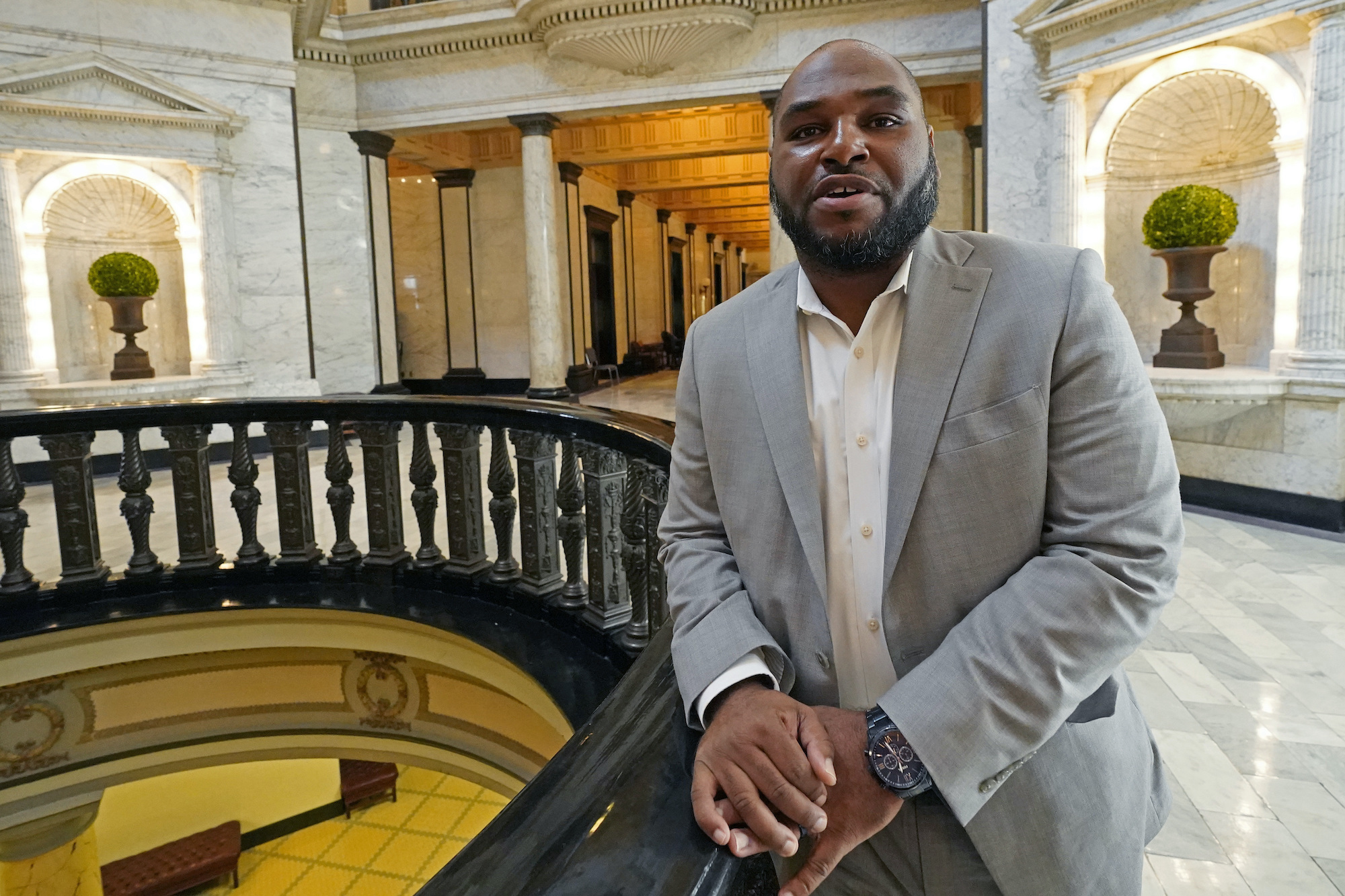
Shuwaski Young, a Democrat who is challenging Watson for Mississippi secretary of state this year, said he opposed the bill in a March 29 statement.
“House Bill 1310 represents a clear and present danger to the sanctity of our right to vote,” Young wrote. “All Mississippians deserve ballot access, and our residents should never be removed from voter rolls because they did not vote in a previous election.”
“Secretary of State Michael Watson and his friends in the state Legislature have perfected limiting folks’ access to the ballot—a history Mississippians know all too well,” he added. “House Bill 1310 is nothing more than a covert voter suppression campaign led by Michael Watson to disguise his intent to intimidate county election commissioners and disenfranchise our most vulnerable residents.”
“As Secretary of State, I will end ramped-up voter purges from our registration rolls and eliminate other disenfranchising tactics such as the absentee ballot notarization poll tax, which is just as archaic as Jim Crow.”
Under H.B. 1030, everyone that local election commissioners send a confirmation notice to would be treated as inactive and could only vote by affidavit even before final removal. Authorities would put the name in purge status after two federal elections from the date of the notice if the individual did not respond, did not update voter roll information or did not vote in any election after receiving the notice. Being an active or reserve military or serving on jury duty would also preclude purging.
“The county registrar shall retain purged voter registration records after they are purged for a period that includes at least two (2) federal general elections and shall record the reason for the removal,” the bill says.
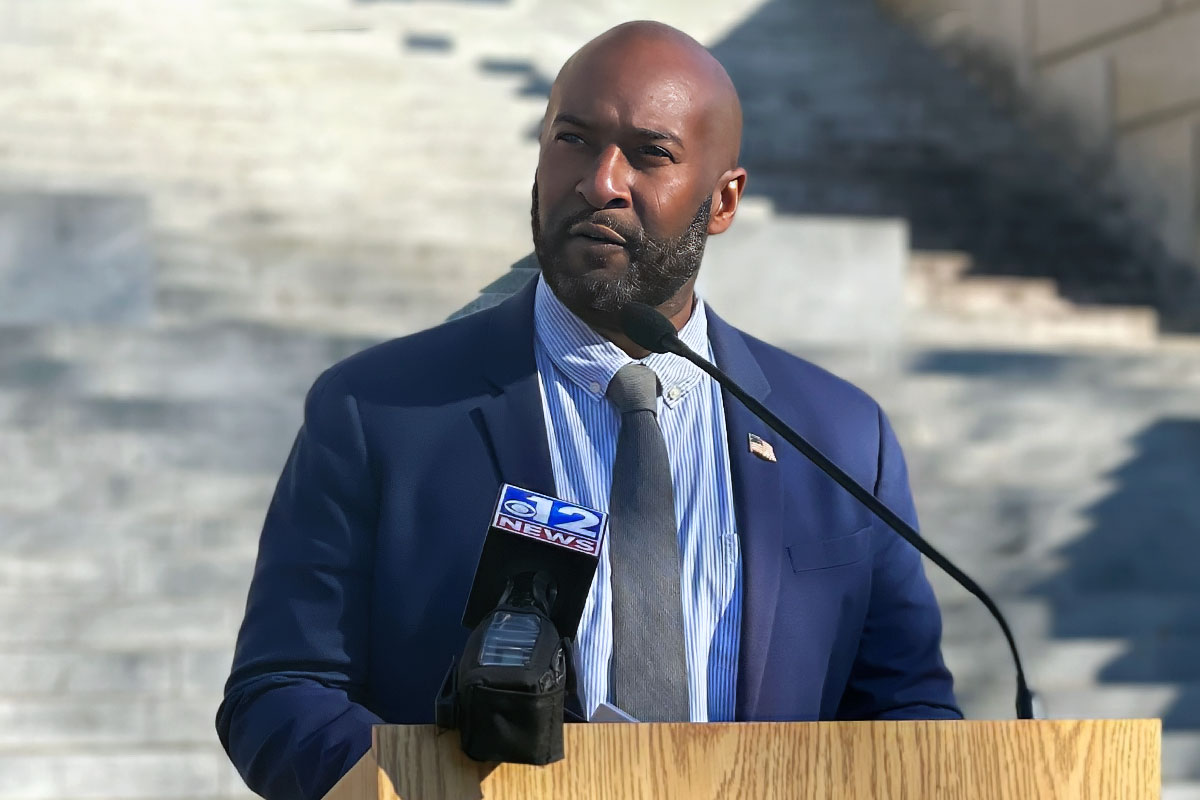
The same bill grants the secretary of state the power to audit the general election yearly from 2023 to 2027.
On March 27, Reeves signed Senate Bill 2358, criminalizing “ballot harvesting,” which the bill defined as transmitting a ballot mailed to someone else. The bill provides some exceptions to that rule, including for postal service staff or family members.
Lawmakers Disagree on Education Funding
The two legislative chambers disagreed on education funding this session, with the Senate proposing a new Mississippi Adequate Education Program formula but with the House refusing to back it. House Bill 1369 did not make it out of the conference after the Senate modified it to change the funding formula, requiring $90 million less than the current version. This year the Legislature approved $37 million more for MAEP than last year and is still over $200 million less than required.
Speaker Gunn reiterated his rejection of the formula to fund education while fielding questions from journalists in his office Monday. Gunn spent three terms as House Speaker and is retiring from the House after the 2023 session.
The current MAEP formula determines how much each district gets based on population, free lunch, growth rate, transportation participants and special school programs.
“I don’t think MAEP is a sacred formula. I don’t think it works. I have said that publicly, and I’ve said that to them privately,” he said. “It is dysfunctional; it is an obsolete, broken formula. I was not willing to put additional money into it just cause I think it needs to be changed.”

Gunn said that about six years ago, the House proposed a new funding formula for education that would have had “an equity component” to add money for children “in a poor district” and “rural district.”
“There was a component for English-language learners. There was one for gifted kids. There was one for special-ed kids. There were like eight different measures,” he added.
Teachers’ pay raises last year cost the state $250 million, and the Legislature has increased education funding this year by $100 million for schools’ use but not for “increases in administrative salaries,” he said. “We do not want to see a large increase in administration.”
Possible uses could be for teachers or assistant teacher-pay raises, textbooks, classroom improvements, computers, “pretty much anything except administrative salaries,” he added. Between last year’s $250 million pay raises and this year’s $100 million increase, Gunn said, the additional $350 million “adds up to be within the ballpark of what MAEP calls for.”
“If MAEP is your gauge about how much money we should put into education, I think we’re there. I think we’ve got it, but it doesn’t mean we got to put it into the formula, and the teacher pay raise from last year, we did not put into the formula, and the hundred million we put this year we did not put in the formula.”
Lt. Gov. Delbert Hosemann said at a press conference Monday that he is open to working with the House to create a new education funding formula.
“Let’s see if we can come up with something that’s achievable there, but while we’re going into the funding, what’s really important to remember is that part of what’s coming out of the education system,” he said. “We have had some schools here that have been F schools for a long time, that’s not acceptable.”
The Parents’ Campaign, a pro-public school advocacy organization, celebrated the increased funding while expressing disappointment over the failure to adopt the new MAEP formula and use it to achieve “fully funded” status.
“While it is shameful that public schools weren’t fully funded, given all the money that was available, your voices were able to move a recalcitrant House Speaker Philip Gunn from $0 to $100 million,” the Parents’ Campaign said in a post on its website on April 6. “Senate Education Chair Dennis DeBar and Lt. Gov. Delbert Hosemann were stalwart in their determination to fully fund the MAEP, and their leadership resulted in a unanimous Senate vote for full funding.”
Hospitals Could Get Boost
More than 100 hospitals in Mississippi could soon receive $103 million in grant awards if the governor signs Senate Bill 2372 and House Bill 271 into law. The bills would grant funds to hospitals based on size, services and location. S.B. 2372 would create the Mississippi Hospital Sustainability Grant Program, while H.B. 271 would serve as the appropriation bill that funds it.
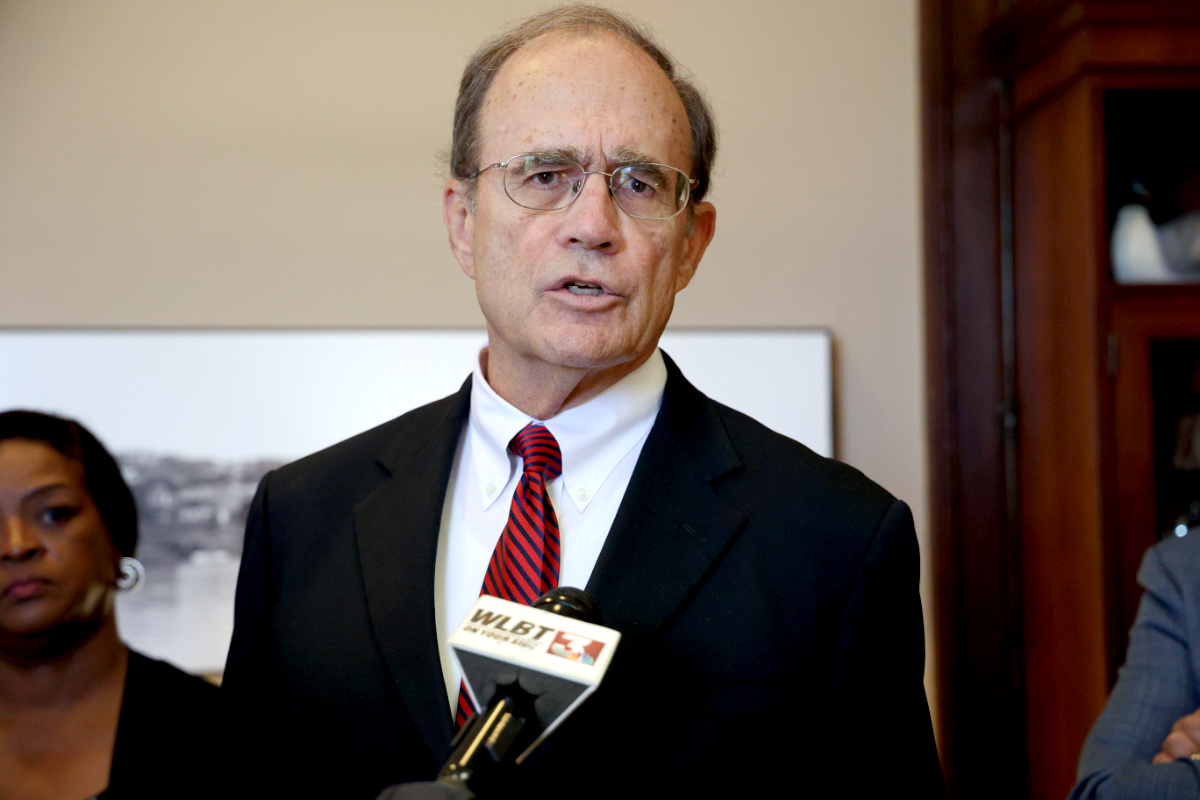
In February, Reeves signed House Bill 1125, which bans “gender transition procedures” for minors in the state in February. The “Regulate Experimental Adolescent Procedures (REAP) Act,” prohibits standard care such as hormone therapy and puberty-blocking drugs and bars public funds from going to “any entity, organization or individual that provides gender transition procedures to a person under eighteen years of age.” The legislation is part of a national right-wing effort to roll back rights and protections for transgender people, with a focus on transgender minors.
After Reeves signed Senate Bill 2212 into law that same month, new moms who cannot afford private insurance will be eligible for a year of postpartum Medicaid coverage starting in July, up from current coverage of two months after child-birth. Lt Gov. Hosemann, who presides over the Senate but does not vote on bills, hailed the move, calling healthy mothers “very important” in a press conference Monday.
The House Speaker did not vote for S.B. 2212, but pointed at other legislation proposed by the “Commission on Life,” which he set up in 2022. He said House Bill 1671 increased tax credits to the controversial pregnancy resource centers, which are often associated with anti-abortion organizations, in the state from $3.5 million to $10 million. It also provides $10 million in tax credits for transitional homes that assist “unwed pregnant women.”
“That is a great example, I think, of how we can incentivize a private-sector solution to a public need without growing government, without spending more, creating a new program or a new government agency or spending more taxpayer dollars,” Gunn said Monday.
Majority Passed H.B. 1020 Over Jackson Resistance
A state-appointed and controversial municipal court system in Jackson’s Capitol Complex Improvement District awaits Gov. Reeve’s approval after the Legislature passed House Bill 1020. The Mississippi Supreme Court chief justice could appoint a municipal judge from any part of the state over the court.
If signed, the bill will take some authority away from elected judges and prosecutors in the 83% Black city’s capitol district, starting in January 2024 and lasting until July 2027, with a planned CCID expansion in July 2024. The bill would create “four temporary special circuit court judges” positions until 2026.
The attorney general would designate two prosecuting attorneys for the inferior court to prosecute crimes inside the CCID and would file criminal indictments for issues arising in part or in whole there “in the same manner and with the same authority of law provided for district attorneys and county prosecuting attorneys.” Both the district attorneys and county attorneys are elected positions in Mississippi.
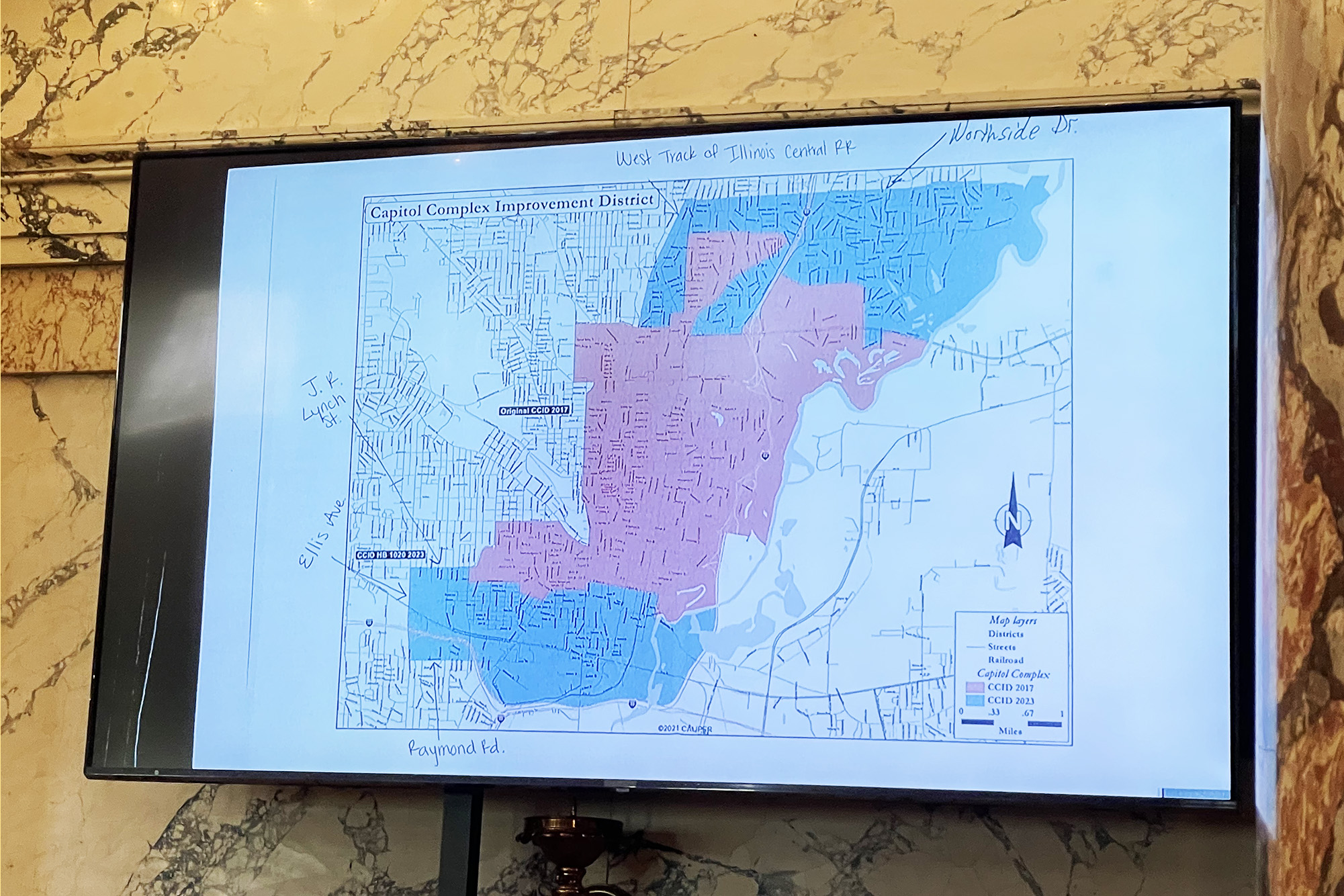
Another bill, Senate Bill 2343, would expand the state-run Capitol Police’s jurisdiction to cover the entire city if the governor signs it.
Hosemann said H.B. 1020 was about safety. “Those systems were here to help the City of Jackson. I’ve lived here for half a century. We hope, and we deserve, to have a capital city that’s safe, and we deserve to have a judicial system that works and we need to have enforcement of the laws or whatever the city or the states says are the law.”
“Our goal would be to have the city come back to where we didn’t have to spend any additional funds on anything like this,” he said.
Rep. Zakiya Summers, D-Jackson, said during the House debate on H.B. 1020 that the money spent on putting in place the new judicial system could be better used as an “investment in the communities.”
When the Mississippi Free Press questioned Hosemann on Monday about the issue Summers raised, he pointed out that the Legislature passed funding for recreational facilities in Jackson. He mentioned Thalia Mara Hall and the planetarium, which the Legislature approved $2 million to each for renovation and upgrades this session. He described those two facilities as “entities” that would give “a cultural lift to the city.”
“I have to look back at what Jackson gets out of a $100-million extra that we put in education. I think that was important,” he added. “I think you’ll see us continuing to fund those as we go forward, our cultural things, our parks, our recreation—parks are really the lungs of the city. They need to be viable and need where people go and be safe there, and you’ll see us doing more things like that.”
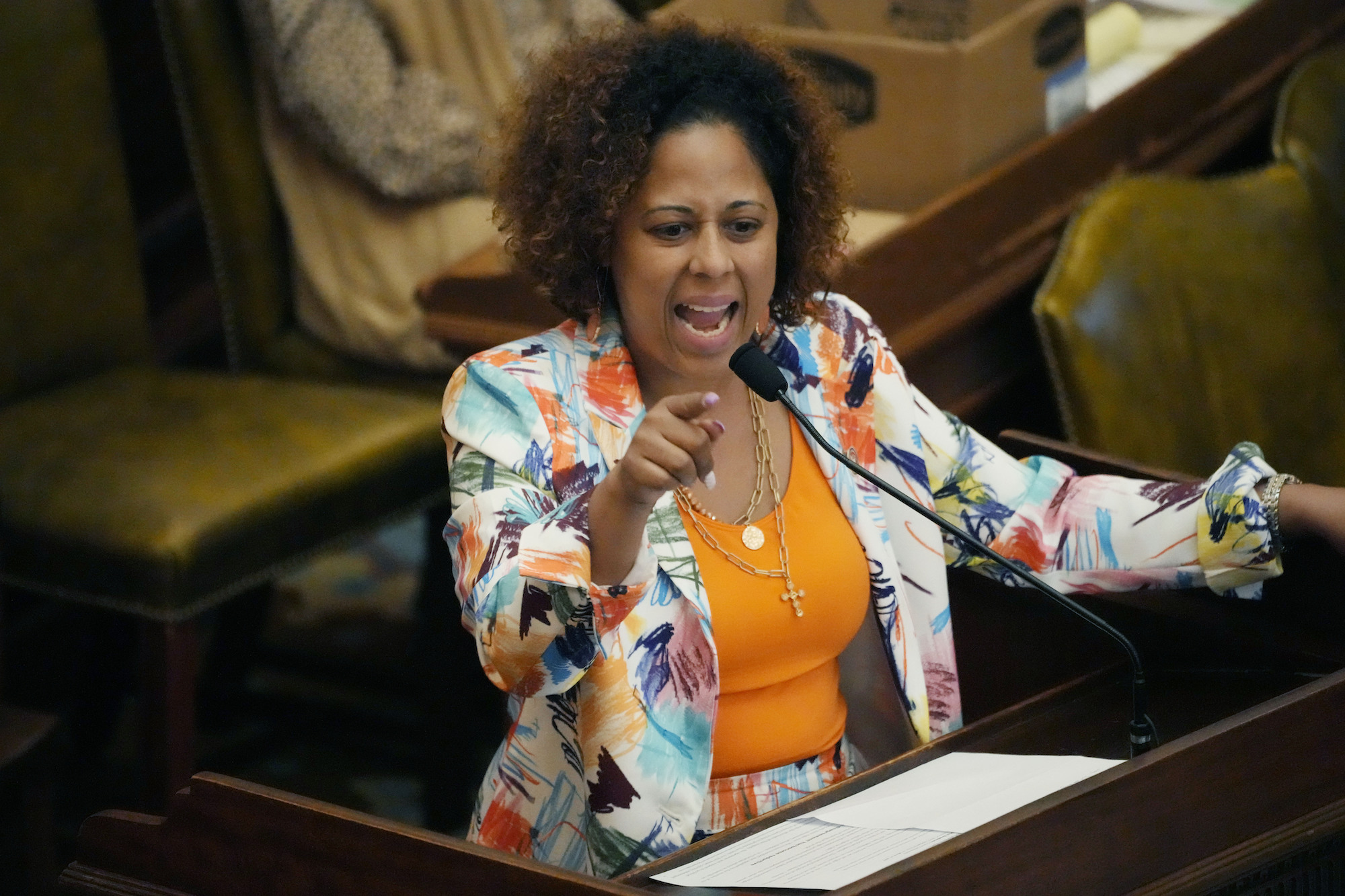
The Legislature also passed House Bill 698, which would limit water and sewer billing to usage instead of property value, rejecting a suggestion Jackson interim third-party water system manager Ted Henifin had made. The bill, which is awaiting the governor’s signature, provides for a possible six-month period whereby a municipality may apply estimated billing based on “prior average measured usage” and “If a user’s meter is tampered with, unreadable, or otherwise out-of-order.”
A proposal to establish a regional utility authority to take over the City of Jackson’s water and sewer system died on the calendar when the House did not take up Senate Bill 2889 by the March 8 deadline.
Speaker Gunn told the Mississippi Free Press on Monday that he did not believe the bill had enough votes to pass.
“It was just an additional controversial issue, and they couldn’t get it worked out was my recollection of that,” he said.
House Bill 993 would have prohibited the controversial One Lake flood control and waterfront development project, whose proponents have proposed it as a means to reduce flooding in Jackson. Those who oppose the project say it would affect marine life in certain regions of the state and could make the flooding worse, but the bill did not make it out of the House Ways and Means Committee and died on Jan. 31.
The governor signed House Bill 1168 on March 27; it would penalize the City of Jackson if it does not file yearly audits for the additional 1% sales tax it collects by withholding funds.
Criminal Justice Bills Passed
Under Senate Bill 2101, a driver who flees from a law enforcement officer and injures someone else will get a minimum of 10 years in prison; if the person dies, the minimum is 20 years. Those penalties are up from prior minimums of three and five years, but keep the respective maximum sentences of 20 and 40 years in place.
The bill, which lawmakers passed as Mississippi’s long history of dangerous and deadly police chases, often over low-level crimes, in the Jackson metro area, awaits Gov. Reeve’s signature.
The bill also creates a mandatory minimum sentence of five years in prison for both carjacking and attempted carjacking, and both retain a maximum of 15 years in prison; the bill provides a minimum prison time of 10 years for both armed carjacking and attempted armed carjacking, with both still attracting a maximum sentence of 30 years. All those crimes currently have no mandatory minimum.

Creating more mandatory minimums would increase the state’s prison population with an increase in cost to the State of Mississippi, FDW.us Mississippi State Director Alesha Judkins said in a statement Monday.
“New mandatory minimum sentences will take power away from judges by limiting their discretion and will mandate sentences that are already available in current law,” she said. “In just the last year, Mississippi’s prison population has increased by an additional 3,000 people.”
“Our growing prison population means our state now has the highest imprisonment rate in the country. The growing prison population is not making our communities safer,” she added.
The number of assistant attorneys and criminal investigators statewide could increase with House Bill 83 and Senate Bill 2082 would relieve incarcerated people of child-support requirements. Both bills await Reeve’s signature.
House Bill. 485, which would standardize rape-kit processing in Mississippi, and House Bill. 995, which would clarify language regarding spousal rape, are on the governor’s desk along with Senate Bill 2079, which would create a program granting educators in Mississippi the ability to carry guns on school campuses.
Mississippians can now possess fentanyl testing strips after Reeves signed House Bill 722 into law on March 13, decriminalizing the materials and removing them from the controlled substance law’s definition of “paraphernalia.” On the same day, Gov. Reeves signed House Bill 4, which made Tianeptine a Schedule III drug.
Ballot initiative Proposal Failed
Mississippians remain without a means to introduce citizen-led ballot initiatives after Senate Concurrent Resolution 533 died along with a last-ditch effort by the lieutenant governor to suspend the rules and push it forward. Speaker Gunn said that effort was insufficient and came too late in conversation with reporters in his office Monday.
The initial version of Senate Resolution 533 would have increased the threshold for a ballot initiative to about 250,000 signatures, or 12% of eligible voters; the House revised it to about 100,000, or about 12% of the total number of voters who participated in the most recent election for governor. The old ballot initiative system, which the Mississippi Supreme Court struck down in 2021, required about 106,000 signatures. The House version would have also prohibited ballot initiatives that would change the state’s abortion laws.
The House Accountability, Efficiency, Transparency Committee allowed the amended bill to die on the calendar.
Hosemann decided to bring it back by suspending the legislative deadline even after he sent a proposal to start negotiations, and kept the House’s prohibition of abortion as a ballot initiative, the lieutenant governor told reporters Monday. The House did not concur with the move.
“We reduced significantly the number of individuals who have to sign,” Hosemann told reporters Monday.
Gunn told reporters Monday that the proposal the Senate still required too many signatures.
“It was 8% of all registered voters—still too high (at) 157,000 people. We were at 106,000. … That was not a serious offer,” Gunn said.
Gunn defended the House’s decision to prohibit abortion-related ballot initiatives. “We believe very strongly in the sanctity of human life, and you want to protect that, and that was a way to make sure that it stays protected,” he said Monday.
Since the U.S. Supreme Court decision in Dobbs v. Jackson Women’s Health Organization last June, multiple polls have found that a majority of Mississippi voters disagree with the ruling. In fact, a significant majority of Mississippians voted to reject the anti-abortion Personhood initiative in 2011.
Ban on Company-Owned Vehicle Stores
Electric-vehicle manufacturers like Tesla and Rivian will be prohibited from setting up company-owned stores to sell cars in the state after Gov. Reeves signed House Bill 401 on March 14. The legislation requires them to use traditional franchised vehicle dealership models like those used by traditional manufacturers. The governor described it as an issue of “fairness.”
But on March 3, the Associated Press reported that Sen. Joey Fillingane, R-Sumrall, warned fellow lawmakers that the legislation “could deprive our citizens of opportunities they really ought not be deprived of.”
“Maybe we just like being last all the time. Maybe it’s a badge of honor—we’re the last ones to change,” he said on the Senate floor.
The Legislature adjourned on April 1 and, unless the governor calls a special session, will not meet again to pass legislation until January 2024.










